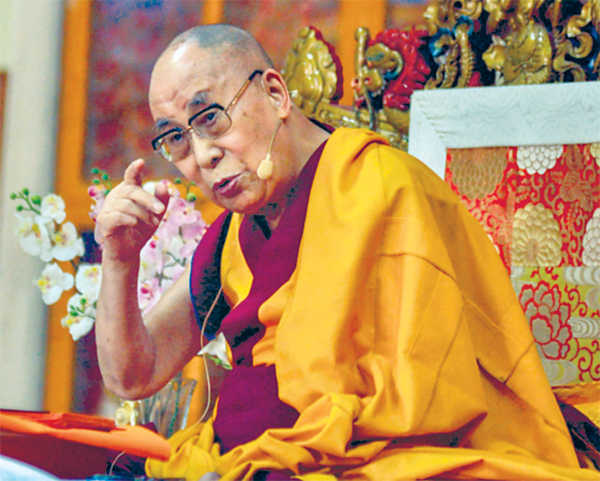- Dalai Lama forgets Nehrus efforts



P K Vasudeva
Nehru tied up with the US in a last-ditch attempt to roll back Chinese control on Tibet. With the help of the CIA, Tibetan freedom fighters were trained in covert CIA camps and resistance was generated. The soldiers were recruited with help from political leaders of the Chushi Gangdruk, the original Tibetan resistance warriors.
Uncalled for: The Dalai Lama should have avoided his controversial remarks on Jinnah-Nehru.
The exiled spiritual and political Tibetan leader, His Holiness the Dalai Lama, at a recent event in a management institute of Goa, surprisingly said that Partition would have been averted had Qaid-e-Azam Muhammad Ali Jinnah become the first Prime Minister of India. "Mahatma Gandhi was very much willing to give the prime-ministership to Jinnah. But Pandit Nehru refused. I think Pandit Nehru was a little bit self-centered," said the Dalai Lama.
Basically, the Dalai Lama should have avoided this uncalled for verdict on Jinnah and Nehru because at the time of granting asylum to him, the Government of India clearly conveyed that he and his "government-in-exile" in Macleodganj, Himachal Pradesh, will not indulge in any political activities in India and shall remain confined to religious and cultural activities pertaining to Tibet.
In 1954, India and China signed the "Panchsheel" Agreement, which recognised the Chinese sovereignty over Tibet and Nehru-led India decided to withdraw its military presence from Tibet. However, Tibetans neither recognised nor endorsed the agreement. But by 1957, when it became pretty evident that the PLA's occupation over Tibet was not going to end, Indian and Tibetan leaders approached the next best option — the US.
With the help of the CIA, Tibetan freedom fighters were trained in covert CIA camps and resistance was generated. They supplied arms and equipment to fight the Chinese army. The CIA recruited locals to fight against the Chinese as guerrillas and were airdropped throughout the resistance period. However, the resistance was thrashed by the PLA. Monks and civilians were executed and monasteries bombed, forcing the Dalai Lama and his followers to stealthily cross over to India in March, 1959. China was angered with the Dalai Lama, as also with India for giving asylum to him and other "faulty" policy decisions of forward deployment of troops, which resulted in the 1962 war.
As the war reached its zenith, a panicky Nehru sought immediate help from US President John F Kennedy. At a meeting held on November 19, 1962 in the White House, the decision was taken for a military aid package in support of the newly created military organisation in India — "Establishment 22" and later the Special Frontier Force (SFF). However, China declared unilateral ceasefire and withdrew from many locations, fearing the US may nuke China if the battle was not stopped.
The CIA and the IB helmed the project and a seasoned officer of the Indian Army, Major-General Sudan Singh Uban, was chosen to be the founder Inspector-General of the SFF. Based in Chakrata, Uttarakhand, the force was put under the direct supervision of the Intelligence Bureau, and later, the Research and Analysis Wing (RAW). With an initial strength of 12,000, the SFF commenced six months of training in rock-climbing and guerrilla warfare. The soldiers were recruited with help from political leaders of the Chushi Gangdruk, the original Tibetan resistance warriors. It was primarily raised to address the lack of intelligence during war and peace. With the formation of RAW by the late 60s, and with the help of the Aviation Research Centre (ARC) which provided airlift facilities, the SFF became fully airborne-qualified and a dedicated mountain warfare force.
The SFF commandos can survive in any hazardous conditions. They are tough, hardy, well trained in rock-climbing, para-trooping and skydiving. They proved their mettle in the Bangladesh war. They were valuable for clandestine intelligence collection, training the Mukti Bahini and carrying out several missions, including the destruction of the Kaptai Dam and bridges. They were also part of Operation Bluestar. They carry out clandestine operations but since they are under RAW, information regarding their clandestine operations remains secret.
Against this backdrop, such words coming from His Holiness are unwelcome. However, the 14th Dalai Lama apologised a couple of days later at Bengaluru at a 'thanksgiving' commemorative function of 60 years of Tibetans' life in exile for his remarks, which he said had stirred a controversy.
To overcome his omission, he said, "Jawaharlal Nehru supported both the setting up of Tibetan settlements as well as the creation of Tibetan schools, so that our culture and language could be preserved."
During the 1959 Tibetan uprising, the Dalai Lama fled to India. After the founding of the government-in-exile, Nehru settled the approximately 80,000 Tibetan refugees who followed him into exile.
The Dalai Lama is the spiritual leader of the Gelug school of Tibetan Buddhism. The Kagyu Karmapa is the spiritual leader of the Karma Kagyu school of Tibetan Buddhism. Interestingly, the current 14th Dalai Lama helped the young and controversial 17th Kagyu Karmapa after he escaped from China in 1999 following the same route the Dalai Lama took in 1959. The recognition of the 17th Karmapa has been a subject of controversy since two candidates have been put forward: Ogyen Trinley Dorje (OTD) and Trinley Thaye Dorje.
Intelligence agencies promote stories about OTD seeking asylum in the US, trying to buy land to settle down there or even returning to China. Last year, he promised to return by November, 2018.The controversy of both the Karmapas can be resolved only with the blessings of the Dalai Lama who before the time of incarnation should declare the real 17th Karmapa for Tibetan unity and support for his successor.
DISCLAIMER:
The views expressed in the Article above are Author’s personal views and kashmiribhatta.in is not responsible for the opinions expressed in the above article.
Courtesy: Tribune: 24 Aug 2018


